We all heard understand, on some level, that eating a well-balanced diet is important for general health. But what does that mean on a practical day-to-day, in the kitchen, basis? It’s easy to become perplexed about what is genuinely beneficial to your health. Is coffee good for you or not? Is it better to consume fewer or more carbohydrates? Do I get enough protein in my diet? Though it is important for each of us to discover what is best for our bodies, there are some basic principles that appear to benefit the majority of people. I will cover some of the more universal nutritional tips here.

Be simple but creative with your food choices
This is one of my favorite nutritional tips! Keeping your diet simple prevents you from becoming overwhelmed by meal plans and grocery shopping trips. However, if you are a parent, you may want to get creative in order to keep your children interested in eating healthy foods. Vegetables appear to be the most contentious of all the foods that children get finicky about. Check your personal attitude toward them and make sure you haven’t set a bad example. (I guess it’s a good thing I’m not a parent when it comes to this metric! I’m very fussy about veggies.)
Limit refined sugar as much as possible
Our diet has a significant impact on our oral health and other systems in the body. This emphasizes the importance of monitoring your family’s sugar consumption. Even if you limit your sugar intake and clean your teeth regularly, acids and natural sugars can destroy teeth and cause decay. Having regular check-ups at your local dentist, such as https://www.northsidedentalgroup.com will go a long way to protecting your teeth as well as catching any problems before they get too big.
Eat five portions of fruit and veg a day
One of the most common nutritional tips is eating five servings of fruits and vegetables every day. This probably true because it has been found to help avoid major diseases like diabetes, cancer, and strokes. This type of fiber also aids in keeping your digestive system healthy and functioning as it should. If your family doesn’t love eating fresh fruits and veggies, try incorporating them into milkshakes, smoothies, and casseroles. The internet is a terrific source of recipe inspiration.
Eat plenty of protein
Protein is required for the body’s growth and repair. It’s also good for weight loss because it’s tougher to digest than other food categories, so you’ll remain satiated for longer. Fortunately, there are numerous high-quality protein choices available to us, including fish, meats, nuts, beans, and fresh vegetables. Therefore, even if you don’t eat animal products, there are still plenty of ways to meet your daily protein requirements.
Of all the nutritional tips in this post, this one can evolve with age and metabolic type. As you grow older, if you’ve been injured, or if you are insulin resistant, your protein needs increase. Be sure to talk with your doctor about your nutritional needs.
Nutritional Tips About Carbs
Talk about a hotbed of controversy! Contrary to popular belief, carbs are not bad. In fact, carbs are a vital source of energy for the human body. Sugars and starches are two types of carbohydrates. For most people, sugary carbs are the more problematic of the two. Overeating can result in a sluggish digestive system as well as weight gain. Starches like whole-grain bread, potatoes, and pasta can be a good supply of unprocessed carbohydrates. These foods are higher in vitamins and minerals, keep you fuller for longer, and keep your bowels healthy thanks to the high fiber content.
My own personal experience: I’ve been on a high-protein, low-carb diet since late last year. However, I kind of when overboard on the protein and started feeling a little ill. I upped my carbs, while still maintaining more protein than carbs in my diet, and started to feel better again.
Nutritional tips are generalities. You need to understand what YOUR body needs. And speaking with your doctor about your unique metabolism will help.

